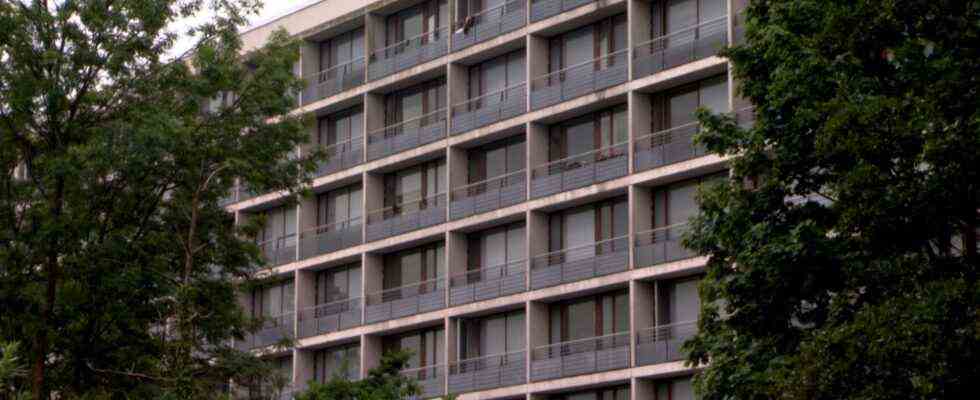World mirror
As of: 07/11/2021 12:24 p.m.
Denmark intends to use a “ghetto law” to mix the population of urban areas in which so-called “non-western” immigrants live. 1000 apartments are now being demolished in a suburb of Aarhus. Does that solve existing social problems?
By Kristopher Sell and Julia Wäschenbach,
ARD studio Stockholm
Mustafa Faour lives with his wife and three children in Gellerup, a suburb in the west of the second largest Danish city of Aarhus. A narrow hallway leads through the apartment on the second floor, and the television is on in the living room. The home offers enough space for the family. But the Faours will have to move out.
The reason is the so-called Danish “Ghetto Law” passed in 2018. It was formally renamed the “Parallel Society Act” by the Social Democratic government in Copenhagen in the spring, but at the same time tightened again. It stipulates that in future only a maximum of 30 percent of “non-Western immigrants” should live in all residential areas in Denmark. In the 15 so-called hard ghettos, where the proportion of these people is particularly high, drastic measures are taking effect: 350 social housing in Gellerup have so far been torn down, 600 are to follow.
With this, the municipality wants to create space for new condominiums, among other things. On the waiting lists for new or refurbished rental apartments, for example, high earners are given preference. The aim is to change the composition of the residents.
Denmark: With a quota in the residential area against “ghetto formation”
Weltspiegel 7:20 p.m., July 11, 2021
Typical Danish names on the door
The Faours apartment is not threatened with demolition. Like many others, the housing company wants to renovate, downsize and then rent it out again.
“My family and I are going to lose a room and a bathroom,” says Faour. His parents flew in Lebanon many years ago before the war. The 34-year-old grew up in Gellerup, and his heart is in the neighborhood. Now he’s looking for a new home.
In the same street, a few hundred meters further, an already renovated building shows what his apartment block could look like in the future. There are many typical Danish names such as Jensen or Nielsen on the doorbell signs in the modern hallway. Ester Engrob lives here. The pensioner moved to Gellerup two years ago. The Danish government wants to use the law to lure people like her into mixing up neighborhoods like Gellerup.
Schools and offices are also being built
“More Danes have moved in since they started renovating,” says Engrob. She doesn’t know what happened to the family that previously lived in her apartment. The 73-year-old feels at home in Gellerup. “I don’t see it as a parallel society,” she says. “We are 80 different nationalities – how can that be parallel?”
The Danish government sees it differently. Four out of five residents in Gellerup are non-Western immigrants. Almost half are not on the job market. Crime is higher than anywhere else in Denmark. The municipality of Aarhus and the housing company should change that by bringing the proportion of social housing in Gellerup below 40 percent. Not only new apartments, but also schools and offices are being built.
Mustafa Faour has to move with his family ….
Image: ARD-Studio Stockholm
… while Ester Engrob is one of the newer residents of the district.
Image: ARD-Studio Stockholm
Remodeling as a big experiment
“This is a very big experiment,” says Keld Laursen, director of the Braband housing association, which is responsible for the renovation. He hopes for a “positive neighbor effect”: Gellerup should develop into a district in which the disadvantaged live next door to new residents who have more resources. But that includes repression.
Mustafa Faour, known in Gellerup as “dansk dreng”, as a Danish boy, sees the problems in his neighborhood. But he doesn’t think that the renovation will solve them: “I hardly think that you can help people who speak little Danish and have never been on the job market by forcing them into another apartment.”
He too feels repressed. Above all, however, he feels that he has been treated unfairly. The 34-year-old runs a chic falafel bar in downtown Aarhus. Students and tourists come by here. Faour Gellerup will serve you mezze and tell you about his district. In 2019, business was so good that the entrepreneur paid the top tax rate in Denmark. “But although I have my own company, earn my own money and don’t seek help from the authorities, I count negatively in the statistics because of my non-Western background.”
You can see these and other reports in Weltspiegel – on Sunday at 7:20 p.m. in Das Erste.

